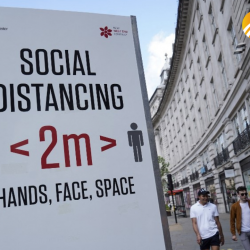Rainbow Capitalism: Does it hurt or help the LGTBQ+ movement?

Every June, gay people around the world celebrate Pride month to honour, recall and rejoice over LGTBQ activists, whose trailblazers changed the world.
The conversation surrounding ‘Rainbow capitalism’, however, also comes up.
Although the concept is often in conflict with an increase in opportunity to celebrate the LGBTQ community and the drive towards the concept of gender diversity, many see it as a marketing tactic. It is also, however, a positive way of introducing society to diversity and to push the same-sex marriage bill.
Rainbow capitalism
Thai PBS World spoke to Tunyawat Kamolwongwat, the Move Forward Party MP who played a crucial part in proposing the amendment of sections in the marriage and family laws, in the Thai Civil and Commercial codes, to allow same-sex marriage, about the good and bad effects of rainbow capitalism.
Tunyawat said that people just have to accept the fact that this is how business works, and the pride month campaign is actually a positive thing. It helps businesses expand their markets.
Tunyawat said, however, that the public should look inside the organization as well, whether they embrace gender diversity. “Are there any transgender people working there? Are there any LGBTQ people in middle management positions or above?” he added.
Commercializing “Pride” in Thailand does create awareness. Whether it can make a difference or not, the government actually plays a crucial role in creating change, according to Kittinun Daramadhaj, President of the Rainbow Sky Association of Thailand.
The association has been working to promote and empower sexual diversity, including support for the same-sex marriage bill.
Kittinun said private organizations’ policies should address human rights issues. He said it is inseparable from business policy nowadays and addressing the issue can also help expand their business
“Their marketing tactics have direct benefits for their bottom lines. Indirectly, they help society to unite but, if you’re asking if it helps put pressure on the government, if the government really cares about human rights, then it is not under pressure,” said Kittinun.
Private sector recognises LGBT+ and offers certain ‘rights’
Business operators have started granting “rights” to members of Thailand’s LGBT+ community as they continue to wait to be granted legal rights Thailand is one of the world’s friendliest Lesbian, Gay, Bisexual, and Transgender (LGBT+) countries and it can be proud of its gender diversity.
Marriage equality
A married man and woman are able to adopt children, have rights to own and manage property, receive an inheritance or even make life and death decisions in medical emergencies. These are safety nets and rights that come along with the legal documentation of a marriage.
Last year, a transgender teacher, who is also a civil servant in Thailand, lost her boyfriend to liver cancer. The cost of medical bills reached 100,000 baht per month, but she was unable to exercise her civil servant’s rights or make medical decisions, all because they couldn’t be legally wed.
This case, unfortunately, is not unique in Thai LGBTQ community.
Tunyawat believes that marriage equality is about people of all genders, and every gender has its own problems.
“We must not forget men and women in parliament, who must be made to understand how the LGBTQ+ community is not being treated equally. So, I think it is necessary to appreciate that every gender has its own problems.”
“The drafting of the life partner bill has been around for almost ten years. Along the way, equal marriage was introduced. I think it is the dynamic of society, which moves with time, and there are many factors that make it possible for communication to develop, such as online platforms, which have led to society reading more international news, seeing how the world works, because gender diversity is a universal issue for the whole world.”
Pride should not be just a campaign ad that bombards retail stores and social media only in June. The importance lies in creating a society that understands gender diversity enough to support and accept same-sex marriage as a matter of equal rights because, as human beings, we all need a safety net, in case life just goes wrong.
By Stephanie Adair






